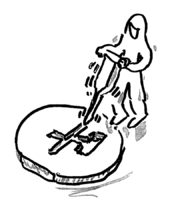Specific Process Knowledge/Direct Structure Definition: Difference between revisions
Appearance
| Line 90: | Line 90: | ||
*Pure quartz (fused silica) | *Pure quartz (fused silica) | ||
|Any | |Any | ||
| | |||
|- | |- | ||
|} | |} | ||
<br clear="all" /> | <br clear="all" /> | ||
Revision as of 11:35, 6 October 2014
Feedback to this page: click here

Direct Structure Definiton

By direct structure definition we mean that you form the structures for you device directly in the material that the device consist of without any masking steps.
Advantages of direct structure definition may be ..
- Quicker process because no need for masking steps
- In some cases the structure is defined directly by a computer, so changes in the design can be made very quickly.
Dis-advantages could be
- Limited choice of materials
- Limited resolution
lakdfjasdfien dfjnsdk djfhk ueuhnndkjnf kjdhf jn uafhisf
Choose method of structuring
Materials for structuring
- Polymers
- Metals
- Silicon
- Glass
Choose equipment
- Laser Micromachining Tool
- Polymer Injection Molder
- Nano Imprint Lithography
- 2-Photon Polymerization Lithography

Comparison of equipment/material
| Polymers | Nano Imprint Lithography | 2-Photon Polymerization Lithography | Polymer Injection Molder | Laser Micromachining Tool |
|---|---|---|---|---|
| Generel description | Low Pressure Chemical Vapour Deposition (LPCVD furnace process) | Plasma Enhanced Chemical Vapour Deposition (PECVD process) | Reactive sputtering | |
| Allowed materials |
Processed wafers have to be RCA cleaned |
|
Any |
